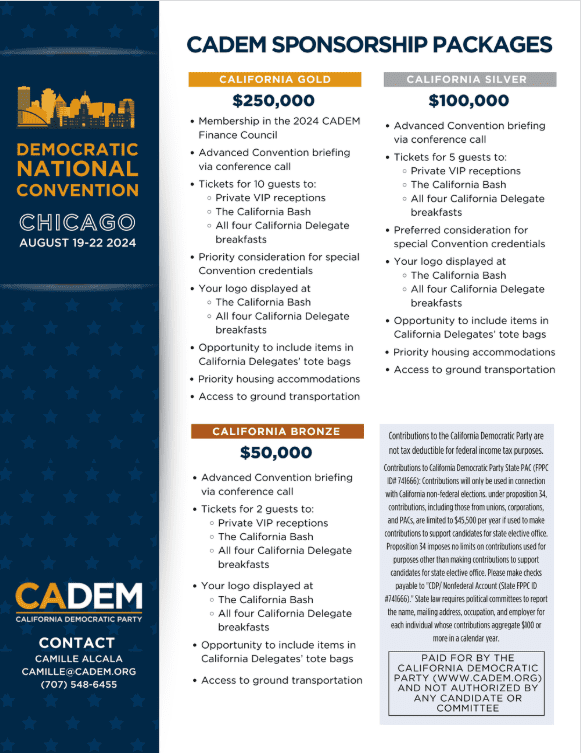
Inside the Democratic National Convention corporate interest moneyfest
This article was paid for by Raw Story subscribers. Not a subscriber? Try us and go ad-free for $1. Prefer to give a one-time tip? Click here.
CHICAGO — In ballrooms, barrooms and backrooms this week, the business of big business is getting done with Democrats out of public view.
Yes, Bernie Sanders on Tuesday railed before Democratic National Convention delegates about how “millionaires and billionaires” should “not be able to buy elections.” And sure, curtailing “the corrupting influence of money in politics” is a plank in the 2024 Democratic Party platform.
But most Democrats in Chicago are ignoring the socialist senator and stepping over and around that party plank while pursuing cash that corporations and moneyed special interests are all too keen to contribute.
Foremost, there are those who are asking for money.
Take the California Democratic Party, the home state party committee of 2024 presidential nominee Kamala Harris.
For $250,000, a corporation, union, trade association or individual can this week claim a “California gold” sponsorship that entitles the giver to a bevy of benefits, according to a brochure obtained by Raw Story.
Among the perks: membership on the party’s finance committee, “private VIP receptions,” eligibility for “special” convention credentials, “priority” lodging and the “opportunity to include items in California delegates’ tote bags.” One’s corporate or organization logo will be “displayed at the California Bash” — a tony party on Aug. 21 at the House of Blues Chicago — and “all four California Delegate breakfasts.”
The Texas Democratic Party similarly offers a $50,000 “Longhorn” package.
In part, it buys a taker “recognition as a title sponsor at our delegation breakfasts & Texas reception,” “one suite in our room block (4 nights)” and “4 guest passes for all Texas delegation breakfasts” and “2 VIP passes to the States Party with access to the Foundation Lounge,” according to a party document appropriately titled “sponsorship opportunities for the 2024 Texas Delegation.”
The Maryland Democratic Party features a $75,000 “Chairman’s Sponsor” package.
For that price, you’ll get “recognition in the Maryland Delegation Hotel and at all 14 Maryland Celebration events” along with a host of other items and honorifics.
And the National Democratic Institute, a nonprofit organization led by former Senate Minority Leader Tom Daschle (D-SD), is promoting its “exclusive landmark event space” to “network with global political leaders” and “400 high-level guests” to “build relationships as they address pressing challenges to democracy,” according to an invitation obtained by Raw Story.
Sponsorships of the National Democratic Institute’s week of Democratic National Convention-themed events in Chicago begin at $10,000 and top out at $250,000 — with a top-tier sponsorship landing the “presenting sponsor” a veritable public relations campaign, ranging from “inclusion of corporate materials at events and in registration packets” to an “invitation to meet Senator Tom Daschle and other high-level leaders.”
Sponsors from past Democratic National Conventions include Facebook, Visa, AT&T, oil company Chevron and pharmaceutical company Amgen, according to the invitation.
Raw Story reviews of more than 20 other convention-themed invitations from political committees, political consulting firms, state delegations and politically focused nonprofits yielded similar offers.
Sunlight dims
Democrats don’t want to talk about this lesser-known side of their national convention, where all manner of special interests have a standing invitation to shmooze with party brass and tour the party’s inner sanctum — for a price.
Officials for the California, Texas and Maryland Democratic committees did not respond to multiple emails and phone calls from Raw Story. Nor did officials from the Democratic National Committee.
Why such secrecy?
Accepting big money is inconvenient for Democrats, who have rhetorically railed against the era of unlimited election spending by corporate, union and certain nonprofit interests, which the Supreme Court’s 2010 decision in Citizens United v. Federal Election Commission animated.